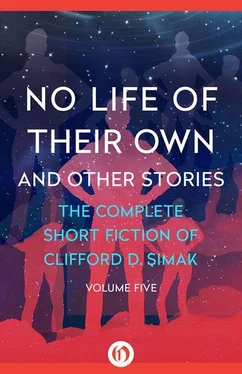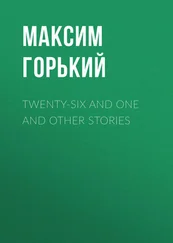“A bunch of the boys had him yarning good just before you came in. Marty Berg was setting them up.”
“About this time Marty always sets them up,” I told him. “Election day is getting close.”
I started to go and then turned back and laid a coin on the bar.
“When he wakes up give him a drink on me,” I said. “He’ll need one then. I’ll try to catch him again before he hits for Sunward.”
But I didn’t catch him again.
Twenty-four hours later they found old Eli’s body in the badlands just west of the city’s port. He had been killed by three vicious knife thrusts. The police said he had been dead twelve or eighteen hours.
Marty Berg was one of those men who can’t go back to Earth. Just what the trouble was no one knew and no one cared to ask. It might have been any number of things, for Marty’s talents are varied.
As a ward heeler in the North Wall precinct, he always delivered the vote. The methods he used were never questioned. What he got out of it no one really cared, for New Chicago had not as yet developed civic consciousness.
When he came into my office I gave him the glad hand, for he was a news source. More than once he’d tipped me off on political shenanigans.
“What’s the news on Eli?” he asked.
“None at all,” I told him. “The police are baffled.”
Marty wagged his head. “Too bad. I hope they catch the guy.”
“What can I do for you, Marty?”
“Just a little favor,” said Marty. “I hear you’re going to Earth for a bit of vacation—”
“In a day or two,” I said. “It’ll be good to see Earth again. A man sort of misses—”
And there I stopped, remembering about Marty not being able to go back.
But he didn’t seem to notice.
“You remember Chesty Lewis? The bird they hooked for forgery?”
“Sure, I met him a couple of times. The cops back in New York used to run him in every now and then.”
“He’s out again,” said Marty, “and I’d like to send him a little gift. Just a remembrance from an old pal. I thought maybe you’d take it along and hand it to him. I’d mail it but the mail rates—”
I could understand that. The mail rates were high.
Marty hauled a package from his pocket and set it on the desk.
I picked it up and shook it. “Listen, Marty, you wouldn’t be getting me into trouble, would you?”
He spread his hands. “Why should I be getting a friend of mine into any trouble? It’s just to save the mailing costs I’m doing this. I’ll tell you what it is. Just one of those sand flasks with different colored sands made into a pretty picture. A picture of a spaceship, this one is. A white ship out in space, with red sand like blasts shooting from the rockets—”
“Forget it, Marty,” I said. “I just wondered. Sure, I’ll take it.”
“Chesty will be nuts about it,” said Marty. “He always did like pretty things.”
Floyd Duncan, veteran chief of the New Chicago office of the Solar Bureau of Investigation, was the first to find the clue in old Eli’s murder and when he found it he didn’t believe it.
He growled at me when I came into his hangout, but I kidded him along and pretty soon he softened up.
“This case has got me down,” he growled.
“No clues?” I asked.
“Hell, yes,” he said. “I got a clue but it’s worse than not having one because it can’t be right.”
“What’s wrong with it?”
“About one hundred years,” he said, rustling papers on his desk and trying to act ferocious.
“You’re all haywire,” I said. “Years haven’t anything to do with clues.”
“You ever heard of Dr. Jennings Anderson?” he asked me.
“The chap who built the sanitarium out on Sunward?”
“That’s the fellow. Built it one hundred fifty years ago. Doc was all of fifty then, himself. Put every dime he had in it. Thought he could cure the space dopes. For that matter the sanitarium is still trying to cure them, but not getting very far.”
I nodded, remembering Anderson’s story. The sanitarium out on the Sunward side still stood as a monument to his hopes and humanitarianism. Recognizing the space disease, which regularly struck down the men who roamed the trails between the planets, as a challenge to his knowledge and his love of humankind, he had constructed the sanitarium, had tried to cure the stricken spacemen by use of the radiations which slashed out from the Sun.
Duncan rattled some more papers and then went on. “Anderson died over one hundred years ago. He’s buried out there at the sanitarium. Folks back on Earth subscribed a pile of money to put up the shaft over his grave. Had to use zero metal. Only thing that will stand up in the radiations.”
I watched Duncan narrowly, wondering what he was getting at. He was right about Doc Anderson being dead, for I had seen the shaft myself, with his name inscribed on it.
“We found a brand-new dollar bill on old Eli,” said Duncan. “We checked for fingerprints. Found a lot of them. Money picks prints up fast, you know. We checked all the prints and they all check out to nothing—all except one.”
He ran blunt fingers through his iron-gray hair.
“That one print,” he told me, “Is that of old Doc Anderson!”
“But, look,” I blurted, “that can’t be right!”
“Of course it can’t be right,” he said. “That’s what worries me.”
Back in my apartment I opened up the package Marty had given me and got the surprise of my life. For once, Marty had told the truth. The thing in the package really was a sand flask, one of those things the gift shops sell to tourists. Made of brilliant Mercutian sands, some of them are really bits of art.
The one I took out of the package wasn’t any piece of art, but it was a fair enough piece of work. I put it on a table and looked at it, wondering why Marty would be sending something like that to an egg like Chesty.
And the more I looked at it, the stronger grew the hunch that there was something wrong. Somewhere something didn’t tie together. This business of sending a sand flask to Chesty Lewis somehow didn’t click.
So I wrapped it up again and hid it in my dresser drawer. Then I went out and hunted through the shops until I found one just like it. I bought that one and wrapped it up and put it in the mails, addressing it to Chesty in care of a boardinghouse that I knew could get in touch with him.
Why I did a thing like that I can’t explain, even to this day. It was just a hunch, one of those unaccountable sixth senses that newsmen sometimes acquire. The whole deal had a phony ring, had put me on my guard.
Back in the apartment once again, I closed the blinds, turned off the lights and tried to go to sleep.
I was dog-tired, but I had a lot of trouble dropping off. My mind kept buzzing round.
I thought about old Eli and the new dollar bill with the one-hundred-year-old fingerprints upon it. I thought about Marty Berg sending a sand flask to Chesty Lewis and wondered if what I had just done would make any difference. I wondered about Doc Anderson, dead these hundred years or more, resting under the stele of zero metal.
Finally I did go to sleep, only to be wakened a short time later with severe stomach pains. Groping blindly on the bedside table I found a couple of capsules, swallowed them and waited for the pain to ease.
It was hours later when I finally awoke.
All sign of stomach distress was gone. I felt a good ten years younger, I told myself, lying there, reluctant to get up. It’s wonderful what a good long sleep will do.
Squaring off in front of the mirror after plugging in my razor, I noticed something funny about the face that stared back at me.
I leaned closer to the glass, trying to figure out what could be wrong. The image that stared back at me was me all right, but it had a different look. There weren’t nearly so many wrinkles and the baggy cheeks had filled up a little bit, and there was a slight flush of color in them.
Читать дальше












